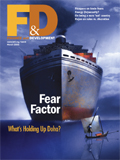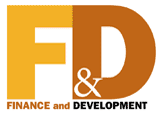
Archive of F&D Issues
Do you subscribe to the hard copy of F&D?

Please fill in this pdf survey
|
|

Subscription Information

Subscription Application Form
(pdf, 420 Kb)

About F&D

Copyright Information

Use the free Adobe Acrobat Reader to view pdf files
Free Email Notification
Receive emails when we post new
items of interest to you.
Subscribe or
Modify your profile

|

|

|

|

A quarterly magazine of the IMF |
|
March 2005
Volume 42,
Number 1 |
What's Holding Up Doha?

Finding a Voice
Hans Peter Lankes
More than three years after launching the latest
phase of global trade talks, known as the Doha Round, little progress
has been made. Tackling the apprehension of small developing countries
seems to be a key to breaking the deadlock. Poorer countries will need
support if they are to overcome their fears, cope with adjustment, and
take full advantage of the opportunities of open trade.
(145 kb, pdf file)
Why Should Small Developing Countries Engage
in the GlobalTrading System?
Point of View examines the concerns of small developing
countries about joining the global trading system. Rubens Ricupero,
former Secretary-General of UNCTAD, stresses that practical initiatives
are needed to exorcize the fears of developing countries about the impact
of liberalization. Faizel Ismail, head of South Africa's delegation
to the WTO, suggests a four-pronged strategy to ease the concerns of developing
countries. And Sok Siphana, Cambodia's Secretary of State
for Commerce, emphasizes that openness, not isolation, is the key, noting
that Cambodia has managed to make WTO rules work in its favor.
(97 kb, pdf file)
Making the WTO More Supportive of Development
Bernard Hoekman
Proposal for a new approach to help developing countries
integrate into the global trading system and make the WTO more supportive
of development by having all WTO members accept a set of core commitments
while allowing latitude in other areas, particularly for developing countries
that have enjoyed opt-outs for certain rules.
(155 kb, pdf file)
Debating Doha

Why Prospects for Trade Talks Are Not Bright
Aaditya Mattoo and
Arvind Subramanian
Substantial
opportunities for trade liberalization undoubtedly exist, but bargains between
industrial and developing countries are becoming increasingly difficult to
strike.
(75 kb, pdf file)
Doha Can Achieve Much More than Skeptics Expect
William R. Cline
The
remaining areas of protection-agriculture, textiles, and apparel-are widely
regarded as the most difficult politically. But with forceful leadership by
both industrial and developing countries, there is good reason to believe that
the Doha Round can move the world substantially further toward global free
trade.
(95 kb, pdf file)
|
 |

Success Requires a
'Grand Vision'
Patrick A. Messerlin
If the global community hopes
to avoid unduly slow progress in the Doha Round, it needs a "Grand Vision"-one
that takes a long-term view and enables emerging market economies to take a
leadership role.
(94 kb, pdf file)
Preference Erosion:
Cause for Alarm?
Katerina Alexandraki
Preference erosion has become an obstacle to completing the
Doha Round. A few vulnerable economies dependent on a handful of products
are most at risk from a loss of trade preferences. But any help for them
should be within the boundaries of a rules-based, non-discriminatory system.
The ultimate aim should be the integration of all countries into the global
economy.
(117 kb, pdf file)
Aligning Aid with Adjustment
Stephen Tokarick
A study on the impact of agricultural trade liberalization
finds that while a number of poor countries would probably face higher
import bills, the size of these increases would generally be small. But,
for the small group of countries that will be hard hit by liberalizing
agricultural trade, special financing schemes will be needed.
(162 kb, pdf file)
How Freer Trade Can
Help Feed the Poor
John Nash and Donald Mitchell
Trade policy may not, at first glance, seem like
the ideal tool for combating hunger. But eradicating costly protectionist
barriers may be one of the best ways to put food on the tables of the
poor. This article presents an agenda for easing hunger worldwide by
reducing trade protectionism.
(133 kb, pdf file)
Also in This Issue

Understanding the
Investment Climate
Warrick Smith and
Mary Hallward-Driemeier
Examining the investment climate and how firms thrive
and create jobs gives economists a new perspective on the dynamics of
development and poverty reduction. New data sources about firms provide
insights into helping economies grow.
(141 kb, pdf file)
Time for Change at the IMF
Vijay L. Kelkar,
Praveen K. Chaudhry, and
Marta Vanduzer-Snow
The authors, who include a former Indian Executive
Director of the IMF, set out an agenda for transforming the IMF and addressing
new forces shaping the global economy. They propose boosting the capital
base of the institution, increasing the voting power of developing countries,
and making the IMF more accountable.
(99 kb, pdf file)
|
Departments

Letter from the Editor
(56 kb, pdf file)
Letters to the Editor
Amartya Sen—a contrarian view; What pace works best for reform?; The IMF must take on corruption.
(59 kb, pdf file)
In Brief

News from international agencies
Asian tsunami spotlights disaster preparedness; the
IMF improves terms on emergency aid; results of F&D's readership
survey.
(72 kb, pdf file)
People in Economics

Managing the Currency of an 'Out' Country
Camilla Andersen profiles Bodil Nyboe Andersen, the
central bank governor of Denmark, a country that is part of the European
Union but opted not to adopt the euro, instead maintaining its own
currency, the krone.
(118 kb, pdf file)
Picture This

Energy (In)security?
Examines energy demand worldwide over the next 30
years. Energy needs will be almost 60 percent higher by 2030, if
governments stick with current policies. But if they adopt more energy-efficient
programs, global energy demand could be 10 percent lower than otherwise.
(149 kb, pdf file)
Back to Basics

Dollarization: Controlling Risk Is Key
Socorro Heysen
Dollarization-the use of a foreign currency, usually
the U.S. dollar, for transactions in another country-was a hot theme
at economic conferences and seminars only a few years ago. Now economists
are putting more emphasis on caution as the costs and risk of dollarization
have become more apparent.
(52 kb, pdf file)
Book Reviews

The World's Banker: A Story of Failed States,
Financial Crises, and the Wealth and Poverty of Nations, Sebastian
Mallaby
Chairman of the Fed: William McChesney Martin and the Creation
of the Modern American Financial System, Robert P.
Bremner
The End of Oil: On the Edge of a Perilous New World, Paul
Roberts
(123 kb, pdf file)
Country Focus

Euro Area
Growth should pick up somewhat in the Euro area
in 2005, but productivity and labor participation must improve
to tackle fiscal pressures from aging, including mounting pension
liabilities.
(86 kb, pdf file)
Straight Talk

Rules versus Discretion
Raghuram Rajan
Should the IMF have less of a free hand in resolving
crises? The Director of the IMF's Research Department examines
whether or not the IMF should follow many central banks in adopting
more of a rules-based approach to problems.
(65 kb, pdf file)
|
|
